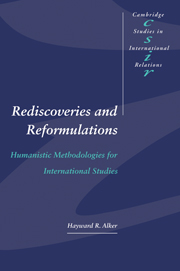Book contents
- Frontmatter
- Contents
- List of figures
- List of tables
- Acknowledgments
- Introduction: Voyages of rediscovery
- Part I Recovering Western antiquity
- 1 The dialectical logic of Thucydides' Melian Dialogue
- 2 Aristotelian political methodologies
- 3 Toynbee's Jesus: Computational hermeneutics and the continuing presence of classical Mediterranean civilization
- Part II The humanistic science of the modern classics
- Part III Contemporary humanistic reformulations
- References
- Index
- CAMBRIDGE STUDIES IN INTERNATIONAL RELATIONS
3 - Toynbee's Jesus: Computational hermeneutics and the continuing presence of classical Mediterranean civilization
Published online by Cambridge University Press: 13 January 2010
- Frontmatter
- Contents
- List of figures
- List of tables
- Acknowledgments
- Introduction: Voyages of rediscovery
- Part I Recovering Western antiquity
- 1 The dialectical logic of Thucydides' Melian Dialogue
- 2 Aristotelian political methodologies
- 3 Toynbee's Jesus: Computational hermeneutics and the continuing presence of classical Mediterranean civilization
- Part II The humanistic science of the modern classics
- Part III Contemporary humanistic reformulations
- References
- Index
- CAMBRIDGE STUDIES IN INTERNATIONAL RELATIONS
Summary
In The Uses of Enchantment, Bruno Bettelheim argues that “our greatest need and most difficult achievement is to find meaning in our lives” (Bettelheim 1977: 3). Most Americans appear at least partially to have achieved this goal with the help of Jesus. In a recent Gallup sample of 1,509 Americans, nine-tenths said they had been influenced by Jesus as a moral and ethical teacher, three-quarters believed that Jesus was alive in Heaven today, 71 percent said that they were deepening their personal relationships with him: two-thirds held that a person must accept Jesus to gain eternal life. “The Gallup organization says a sample of 1,500 is subject to a margin of error of two to three percentage points” (Briggs 1983).
The meaning of the Christian message is much more uncertain and variable than these sampling margins suggest. Few countries in the world are both as religiously Christian and as intellectually ignorant of the tenets of their dominant religion as the same Gallup poll suggests. Nearly three-fifths of the American survey panel did not know that Jesus delivered the Sermon on the Mount; 46 percent of the sample could not name the four Gospels considered by all scholars to be the single most important extant source on the life and teachings of Jesus. Moreover, a third of these Americans “believed it was possible to obtain everlasting life without accepting Jesus, and nearly a fourth thought it was possible to be a ‘true Christian’ without believing Jesus was divine” (Briggs 1983).
- Type
- Chapter
- Information
- Rediscoveries and ReformulationsHumanistic Methodologies for International Studies, pp. 104 - 144Publisher: Cambridge University PressPrint publication year: 1996
- 1
- Cited by



